University Health Law and Policy Report: Immunization in Evergreen
VerifiedAdded on 2023/04/20
|6
|1261
|157
Report
AI Summary
This report analyzes the health law and policy issues surrounding immunization in the State of Evergreen, focusing on the recent outbreaks of whooping cough and the proposed legislation to remove religious exemptions. The report examines the importance of immunization to healthcare organizations, identifying key stakeholders such as legislators, healthcare professionals, and parents, and how they shape the health law and policy. It also identifies potential legal risks and malpractice issues, particularly regarding the lack of professional knowledge and patient-centered care. The report highlights value conflicts among stakeholders, such as those between legislators mandating immunization and parents with religious beliefs, and between primary care officers and legislators. The report emphasizes the need for informed consent and addresses the complex interplay of law, ethics, and public health in the context of immunization debates, providing a detailed overview of the stakeholders, legal risks, and value conflicts involved.
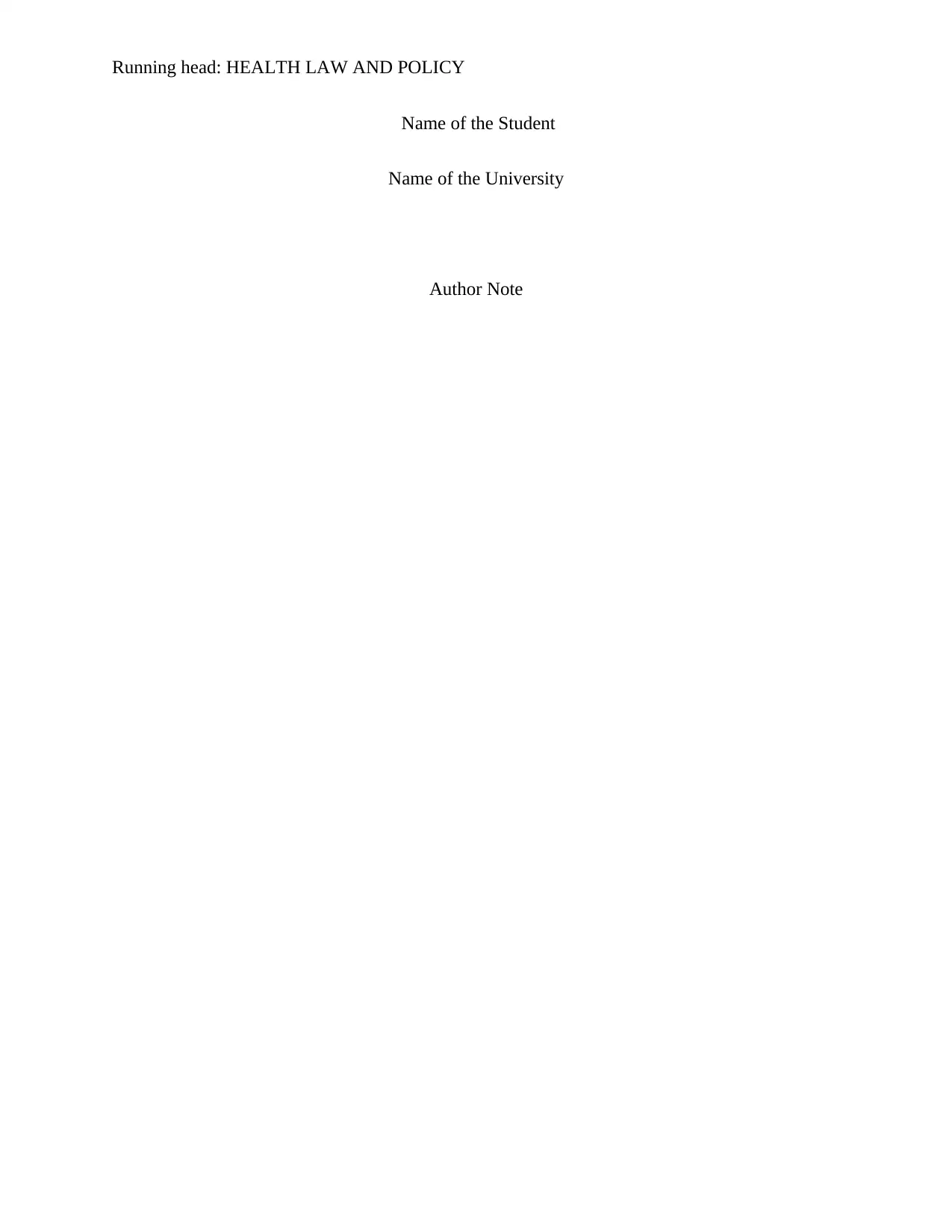
Running head: HEALTH LAW AND POLICY
Name of the Student
Name of the University
Author Note
Name of the Student
Name of the University
Author Note
Paraphrase This Document
Need a fresh take? Get an instant paraphrase of this document with our AI Paraphraser
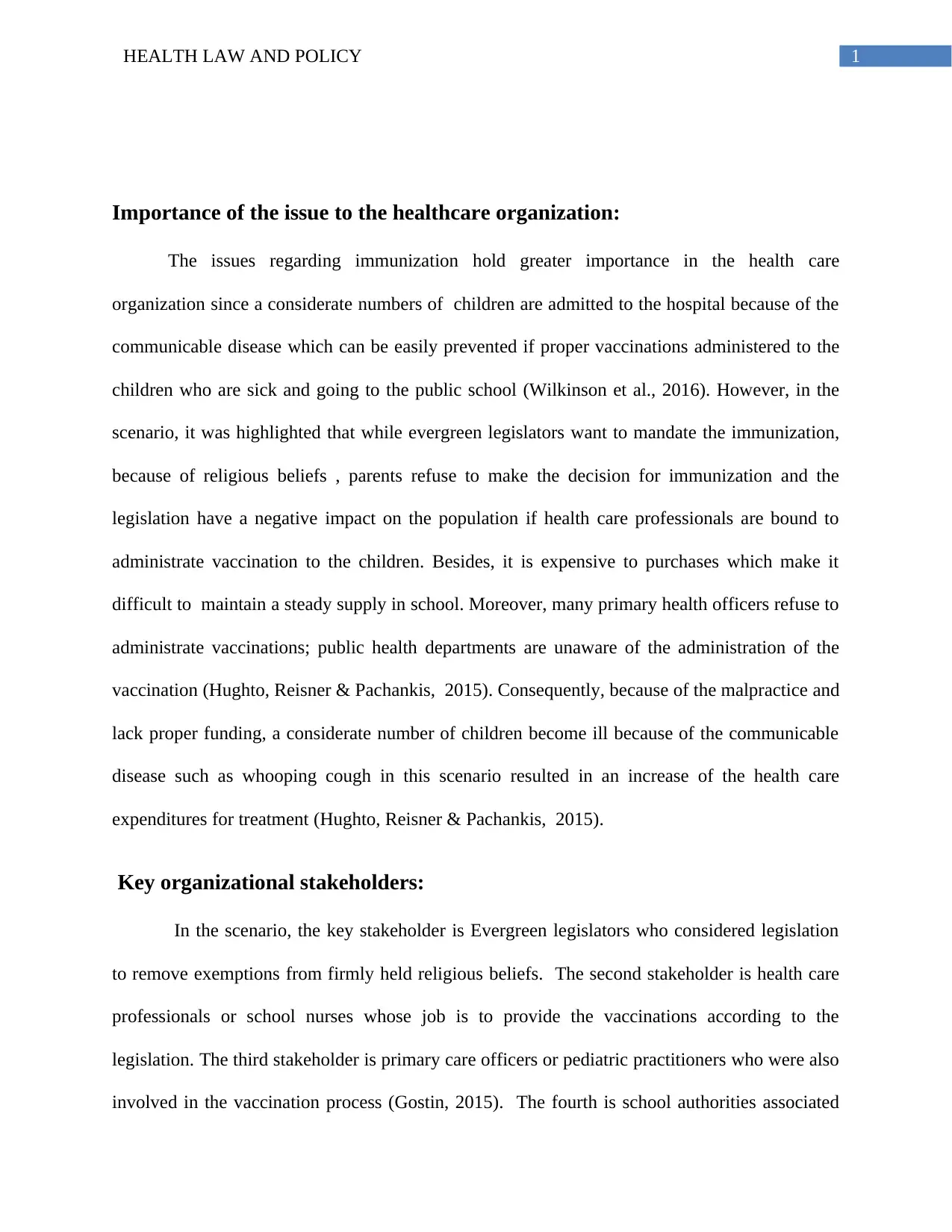
1HEALTH LAW AND POLICY
Importance of the issue to the healthcare organization:
The issues regarding immunization hold greater importance in the health care
organization since a considerate numbers of children are admitted to the hospital because of the
communicable disease which can be easily prevented if proper vaccinations administered to the
children who are sick and going to the public school (Wilkinson et al., 2016). However, in the
scenario, it was highlighted that while evergreen legislators want to mandate the immunization,
because of religious beliefs , parents refuse to make the decision for immunization and the
legislation have a negative impact on the population if health care professionals are bound to
administrate vaccination to the children. Besides, it is expensive to purchases which make it
difficult to maintain a steady supply in school. Moreover, many primary health officers refuse to
administrate vaccinations; public health departments are unaware of the administration of the
vaccination (Hughto, Reisner & Pachankis, 2015). Consequently, because of the malpractice and
lack proper funding, a considerate number of children become ill because of the communicable
disease such as whooping cough in this scenario resulted in an increase of the health care
expenditures for treatment (Hughto, Reisner & Pachankis, 2015).
Key organizational stakeholders:
In the scenario, the key stakeholder is Evergreen legislators who considered legislation
to remove exemptions from firmly held religious beliefs. The second stakeholder is health care
professionals or school nurses whose job is to provide the vaccinations according to the
legislation. The third stakeholder is primary care officers or pediatric practitioners who were also
involved in the vaccination process (Gostin, 2015). The fourth is school authorities associated
Importance of the issue to the healthcare organization:
The issues regarding immunization hold greater importance in the health care
organization since a considerate numbers of children are admitted to the hospital because of the
communicable disease which can be easily prevented if proper vaccinations administered to the
children who are sick and going to the public school (Wilkinson et al., 2016). However, in the
scenario, it was highlighted that while evergreen legislators want to mandate the immunization,
because of religious beliefs , parents refuse to make the decision for immunization and the
legislation have a negative impact on the population if health care professionals are bound to
administrate vaccination to the children. Besides, it is expensive to purchases which make it
difficult to maintain a steady supply in school. Moreover, many primary health officers refuse to
administrate vaccinations; public health departments are unaware of the administration of the
vaccination (Hughto, Reisner & Pachankis, 2015). Consequently, because of the malpractice and
lack proper funding, a considerate number of children become ill because of the communicable
disease such as whooping cough in this scenario resulted in an increase of the health care
expenditures for treatment (Hughto, Reisner & Pachankis, 2015).
Key organizational stakeholders:
In the scenario, the key stakeholder is Evergreen legislators who considered legislation
to remove exemptions from firmly held religious beliefs. The second stakeholder is health care
professionals or school nurses whose job is to provide the vaccinations according to the
legislation. The third stakeholder is primary care officers or pediatric practitioners who were also
involved in the vaccination process (Gostin, 2015). The fourth is school authorities associated
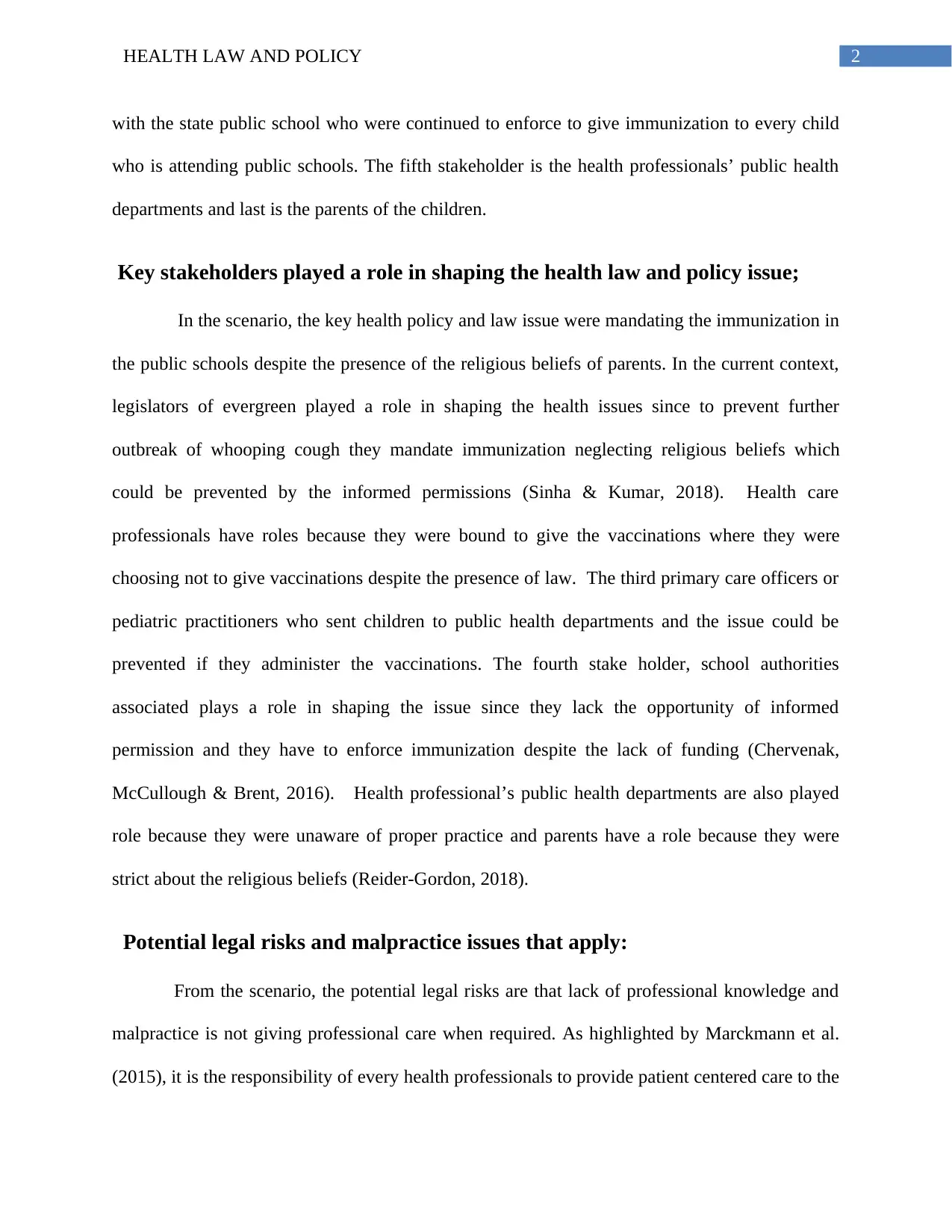
2HEALTH LAW AND POLICY
with the state public school who were continued to enforce to give immunization to every child
who is attending public schools. The fifth stakeholder is the health professionals’ public health
departments and last is the parents of the children.
Key stakeholders played a role in shaping the health law and policy issue;
In the scenario, the key health policy and law issue were mandating the immunization in
the public schools despite the presence of the religious beliefs of parents. In the current context,
legislators of evergreen played a role in shaping the health issues since to prevent further
outbreak of whooping cough they mandate immunization neglecting religious beliefs which
could be prevented by the informed permissions (Sinha & Kumar, 2018). Health care
professionals have roles because they were bound to give the vaccinations where they were
choosing not to give vaccinations despite the presence of law. The third primary care officers or
pediatric practitioners who sent children to public health departments and the issue could be
prevented if they administer the vaccinations. The fourth stake holder, school authorities
associated plays a role in shaping the issue since they lack the opportunity of informed
permission and they have to enforce immunization despite the lack of funding (Chervenak,
McCullough & Brent, 2016). Health professional’s public health departments are also played
role because they were unaware of proper practice and parents have a role because they were
strict about the religious beliefs (Reider-Gordon, 2018).
Potential legal risks and malpractice issues that apply:
From the scenario, the potential legal risks are that lack of professional knowledge and
malpractice is not giving professional care when required. As highlighted by Marckmann et al.
(2015), it is the responsibility of every health professionals to provide patient centered care to the
with the state public school who were continued to enforce to give immunization to every child
who is attending public schools. The fifth stakeholder is the health professionals’ public health
departments and last is the parents of the children.
Key stakeholders played a role in shaping the health law and policy issue;
In the scenario, the key health policy and law issue were mandating the immunization in
the public schools despite the presence of the religious beliefs of parents. In the current context,
legislators of evergreen played a role in shaping the health issues since to prevent further
outbreak of whooping cough they mandate immunization neglecting religious beliefs which
could be prevented by the informed permissions (Sinha & Kumar, 2018). Health care
professionals have roles because they were bound to give the vaccinations where they were
choosing not to give vaccinations despite the presence of law. The third primary care officers or
pediatric practitioners who sent children to public health departments and the issue could be
prevented if they administer the vaccinations. The fourth stake holder, school authorities
associated plays a role in shaping the issue since they lack the opportunity of informed
permission and they have to enforce immunization despite the lack of funding (Chervenak,
McCullough & Brent, 2016). Health professional’s public health departments are also played
role because they were unaware of proper practice and parents have a role because they were
strict about the religious beliefs (Reider-Gordon, 2018).
Potential legal risks and malpractice issues that apply:
From the scenario, the potential legal risks are that lack of professional knowledge and
malpractice is not giving professional care when required. As highlighted by Marckmann et al.
(2015), it is the responsibility of every health professionals to provide patient centered care to the
⊘ This is a preview!⊘
Do you want full access?
Subscribe today to unlock all pages.

Trusted by 1+ million students worldwide
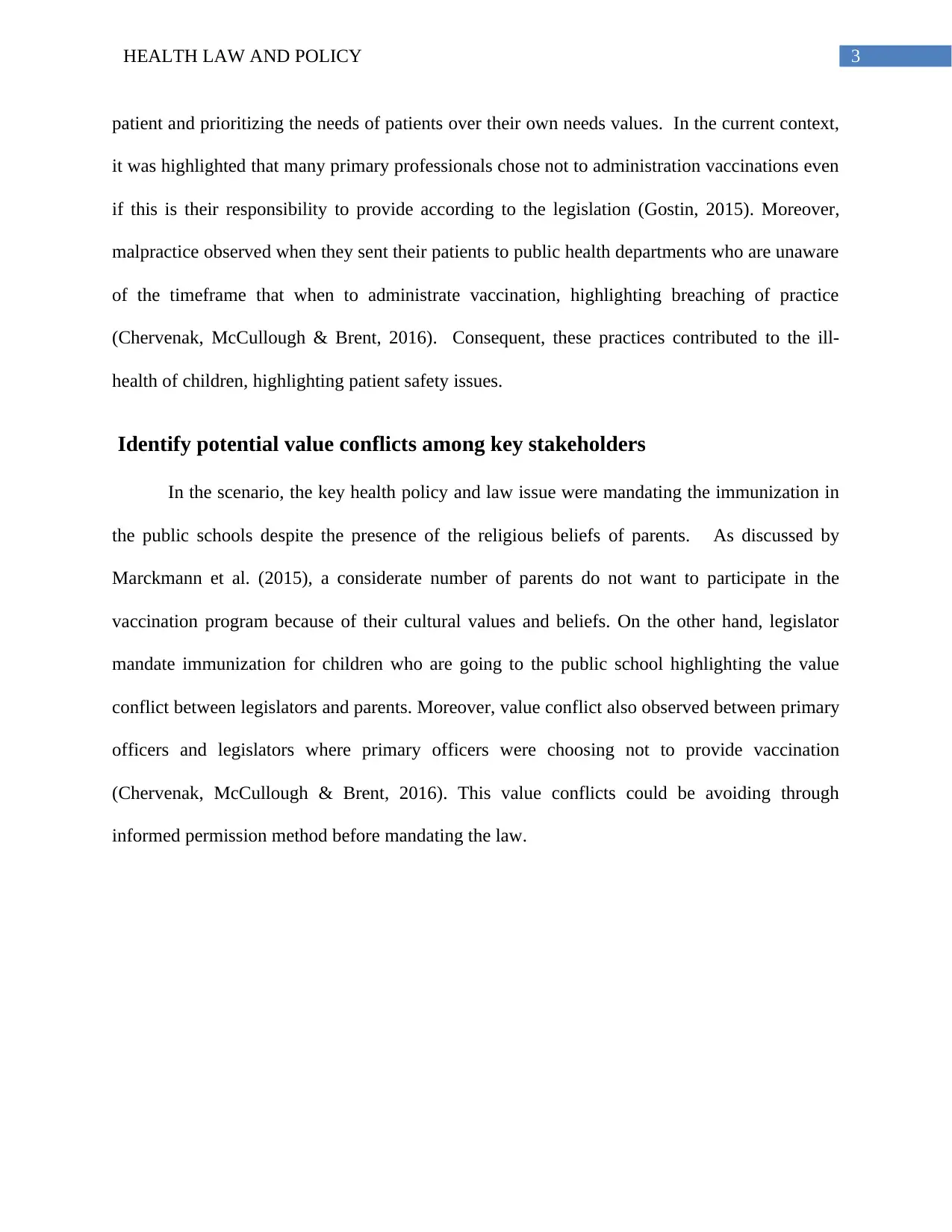
3HEALTH LAW AND POLICY
patient and prioritizing the needs of patients over their own needs values. In the current context,
it was highlighted that many primary professionals chose not to administration vaccinations even
if this is their responsibility to provide according to the legislation (Gostin, 2015). Moreover,
malpractice observed when they sent their patients to public health departments who are unaware
of the timeframe that when to administrate vaccination, highlighting breaching of practice
(Chervenak, McCullough & Brent, 2016). Consequent, these practices contributed to the ill-
health of children, highlighting patient safety issues.
Identify potential value conflicts among key stakeholders
In the scenario, the key health policy and law issue were mandating the immunization in
the public schools despite the presence of the religious beliefs of parents. As discussed by
Marckmann et al. (2015), a considerate number of parents do not want to participate in the
vaccination program because of their cultural values and beliefs. On the other hand, legislator
mandate immunization for children who are going to the public school highlighting the value
conflict between legislators and parents. Moreover, value conflict also observed between primary
officers and legislators where primary officers were choosing not to provide vaccination
(Chervenak, McCullough & Brent, 2016). This value conflicts could be avoiding through
informed permission method before mandating the law.
patient and prioritizing the needs of patients over their own needs values. In the current context,
it was highlighted that many primary professionals chose not to administration vaccinations even
if this is their responsibility to provide according to the legislation (Gostin, 2015). Moreover,
malpractice observed when they sent their patients to public health departments who are unaware
of the timeframe that when to administrate vaccination, highlighting breaching of practice
(Chervenak, McCullough & Brent, 2016). Consequent, these practices contributed to the ill-
health of children, highlighting patient safety issues.
Identify potential value conflicts among key stakeholders
In the scenario, the key health policy and law issue were mandating the immunization in
the public schools despite the presence of the religious beliefs of parents. As discussed by
Marckmann et al. (2015), a considerate number of parents do not want to participate in the
vaccination program because of their cultural values and beliefs. On the other hand, legislator
mandate immunization for children who are going to the public school highlighting the value
conflict between legislators and parents. Moreover, value conflict also observed between primary
officers and legislators where primary officers were choosing not to provide vaccination
(Chervenak, McCullough & Brent, 2016). This value conflicts could be avoiding through
informed permission method before mandating the law.
Paraphrase This Document
Need a fresh take? Get an instant paraphrase of this document with our AI Paraphraser
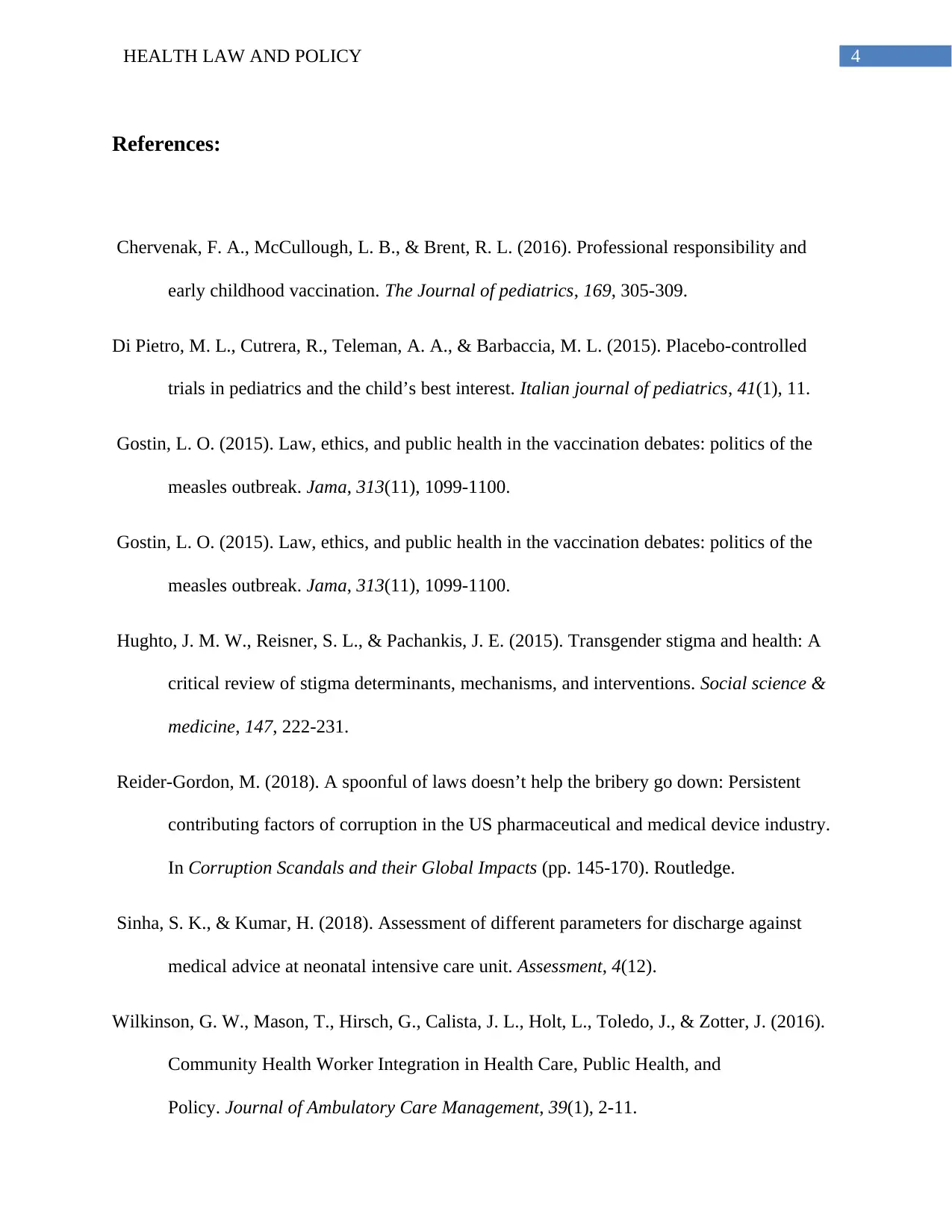
4HEALTH LAW AND POLICY
References:
Chervenak, F. A., McCullough, L. B., & Brent, R. L. (2016). Professional responsibility and
early childhood vaccination. The Journal of pediatrics, 169, 305-309.
Di Pietro, M. L., Cutrera, R., Teleman, A. A., & Barbaccia, M. L. (2015). Placebo-controlled
trials in pediatrics and the child’s best interest. Italian journal of pediatrics, 41(1), 11.
Gostin, L. O. (2015). Law, ethics, and public health in the vaccination debates: politics of the
measles outbreak. Jama, 313(11), 1099-1100.
Gostin, L. O. (2015). Law, ethics, and public health in the vaccination debates: politics of the
measles outbreak. Jama, 313(11), 1099-1100.
Hughto, J. M. W., Reisner, S. L., & Pachankis, J. E. (2015). Transgender stigma and health: A
critical review of stigma determinants, mechanisms, and interventions. Social science &
medicine, 147, 222-231.
Reider-Gordon, M. (2018). A spoonful of laws doesn’t help the bribery go down: Persistent
contributing factors of corruption in the US pharmaceutical and medical device industry.
In Corruption Scandals and their Global Impacts (pp. 145-170). Routledge.
Sinha, S. K., & Kumar, H. (2018). Assessment of different parameters for discharge against
medical advice at neonatal intensive care unit. Assessment, 4(12).
Wilkinson, G. W., Mason, T., Hirsch, G., Calista, J. L., Holt, L., Toledo, J., & Zotter, J. (2016).
Community Health Worker Integration in Health Care, Public Health, and
Policy. Journal of Ambulatory Care Management, 39(1), 2-11.
References:
Chervenak, F. A., McCullough, L. B., & Brent, R. L. (2016). Professional responsibility and
early childhood vaccination. The Journal of pediatrics, 169, 305-309.
Di Pietro, M. L., Cutrera, R., Teleman, A. A., & Barbaccia, M. L. (2015). Placebo-controlled
trials in pediatrics and the child’s best interest. Italian journal of pediatrics, 41(1), 11.
Gostin, L. O. (2015). Law, ethics, and public health in the vaccination debates: politics of the
measles outbreak. Jama, 313(11), 1099-1100.
Gostin, L. O. (2015). Law, ethics, and public health in the vaccination debates: politics of the
measles outbreak. Jama, 313(11), 1099-1100.
Hughto, J. M. W., Reisner, S. L., & Pachankis, J. E. (2015). Transgender stigma and health: A
critical review of stigma determinants, mechanisms, and interventions. Social science &
medicine, 147, 222-231.
Reider-Gordon, M. (2018). A spoonful of laws doesn’t help the bribery go down: Persistent
contributing factors of corruption in the US pharmaceutical and medical device industry.
In Corruption Scandals and their Global Impacts (pp. 145-170). Routledge.
Sinha, S. K., & Kumar, H. (2018). Assessment of different parameters for discharge against
medical advice at neonatal intensive care unit. Assessment, 4(12).
Wilkinson, G. W., Mason, T., Hirsch, G., Calista, J. L., Holt, L., Toledo, J., & Zotter, J. (2016).
Community Health Worker Integration in Health Care, Public Health, and
Policy. Journal of Ambulatory Care Management, 39(1), 2-11.
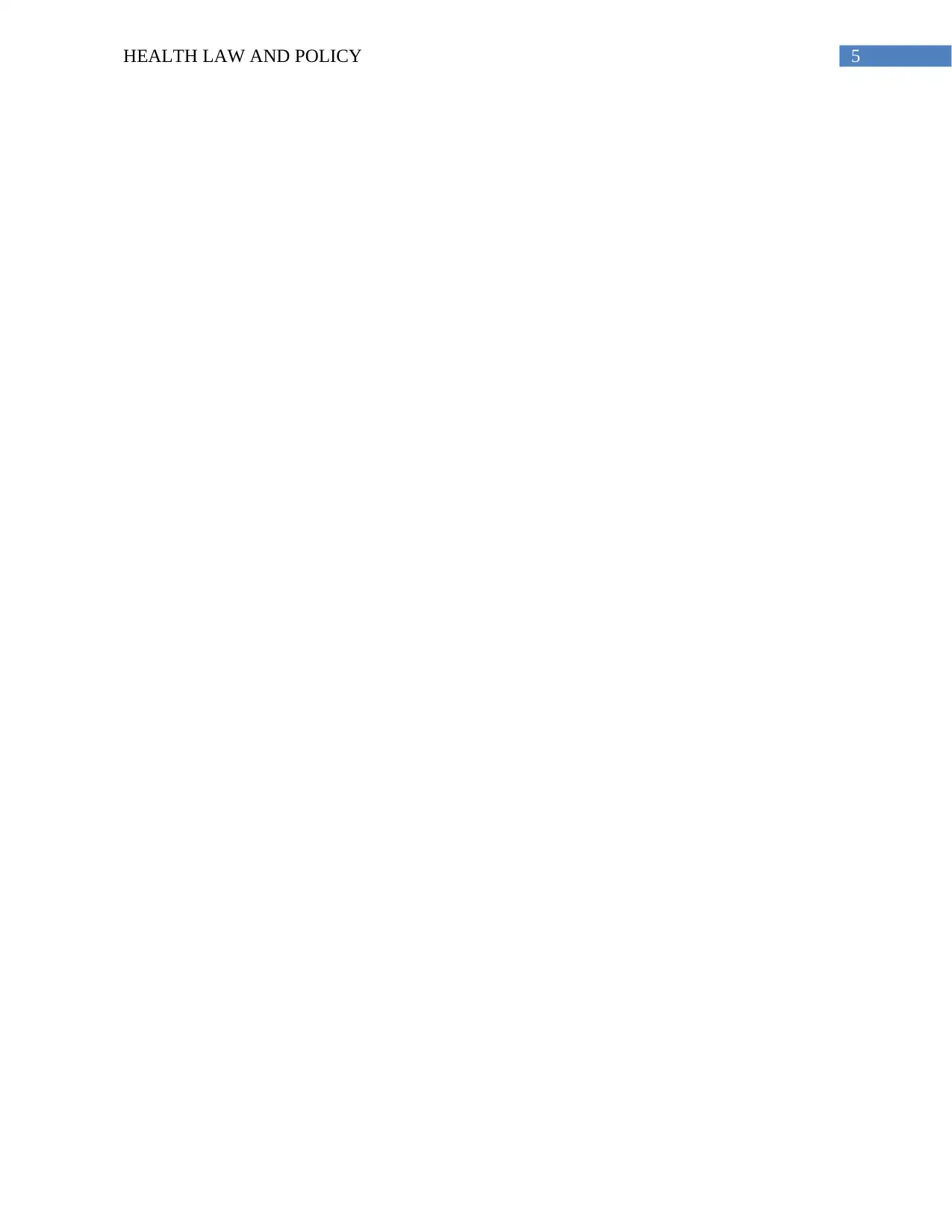
5HEALTH LAW AND POLICY
⊘ This is a preview!⊘
Do you want full access?
Subscribe today to unlock all pages.

Trusted by 1+ million students worldwide
1 out of 6
Related Documents
Your All-in-One AI-Powered Toolkit for Academic Success.
+13062052269
info@desklib.com
Available 24*7 on WhatsApp / Email
![[object Object]](/_next/static/media/star-bottom.7253800d.svg)
Unlock your academic potential
Copyright © 2020–2026 A2Z Services. All Rights Reserved. Developed and managed by ZUCOL.





